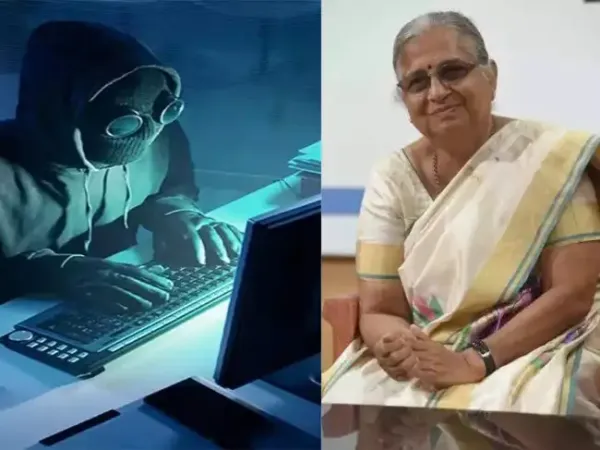Rajya Sabha MP and philanthropist Sudha Murty has reported a cyber fraud incident after receiving a threatening call from an individual claiming to be from the Department of Telecommunications (DoT). The incident occurred on September 5, prompting Murty to file a police complaint in Bengaluru, officials said.
Digital arrest scams involve fraudsters impersonating police or enforcement officials and threatening victims through WhatsApp video calls, claiming they are booked in criminal cases. In Preeti’s case, the fraudsters posed as officials from the Mumbai Cyber Crime Police and told her that an illegal transfer had occurred from her bank account. They claimed the money had to be sent to the Reserve Bank of India (RBI) for verification and promised to return it within 45 minutes. They also threatened that failure to comply would lead to arrest.
Police said the fraudsters managed to transfer Rs 14 lakh from Preeti’s HDFC Bank account to an unknown YES Bank account. After filing a complaint with the police and contacting the National Cyber Helpline (NCRP) within the ‘Golden Hour,’ authorities froze the transferred amount. Following a court order, the entire amount was returned to her account.
He also referenced Murty’s case, pointing out that “when the scamsters can call Infosys founder N R Narayana Murthy’s wife, then one can only imagine to what extent a digital scam is taking place.”
Sudhakar highlighted the importance of strengthening cybercrime divisions and using technology to trace fraudsters. “Innocent people lose their money quite quickly. Many scholarly and learned people have also lost their money. I appeal to everyone that cyber fraud has become a big problem today,” he said.
What happened
According to ANI, Murty received a phone call on September 5 from a person posing as a DoT official. The caller alleged that some obscene videos were being circulated online from her mobile number linked to her Aadhaar. He reportedly threatened to disconnect her mobile services by noon if she failed to comply. The caller’s number appeared on Truecaller as “Telecom Dept,” which added to the deception.Complaint registered by Sudha Murty
Murty approached the Cyber Crime Police Station in Bengaluru, where an FIR was registered under relevant sections of the Information Technology Act. Police confirmed that the caller attempted to extract personal information using a fake identity as a DoT official. Investigations are ongoing to trace the fraudster.Similar cases highlight growing cyber threats
In a related incident, Bengaluru police recently recovered Rs 14 lakh lost by Preeti, wife of BJP Chikkaballapura MP K Sudhakar, in a cyber fraud involving a “digital arrest” scam. The incident took place on August 26.Digital arrest scams involve fraudsters impersonating police or enforcement officials and threatening victims through WhatsApp video calls, claiming they are booked in criminal cases. In Preeti’s case, the fraudsters posed as officials from the Mumbai Cyber Crime Police and told her that an illegal transfer had occurred from her bank account. They claimed the money had to be sent to the Reserve Bank of India (RBI) for verification and promised to return it within 45 minutes. They also threatened that failure to comply would lead to arrest.
Police said the fraudsters managed to transfer Rs 14 lakh from Preeti’s HDFC Bank account to an unknown YES Bank account. After filing a complaint with the police and contacting the National Cyber Helpline (NCRP) within the ‘Golden Hour,’ authorities froze the transferred amount. Following a court order, the entire amount was returned to her account.
Officials advise prompt action
Deputy Commissioner of Police of West Division, Girish S, urged the public not to panic if they fall victim to such scams. “If a complaint is immediately lodged (within Golden Hour) with the National Cyber Helpline (NCRP) number 1930, and a case is registered at the nearest police station without delay, prompt action can be taken to prevent losses,” he said.Public figures stress awareness
Speaking in Chikkaballapura, Sudhakar expressed concern over the rise in digital scams. He said, “They had called my wife in a similar manner. Soon after she lodged a complaint, the money was refunded within 45 minutes, which is a different issue, but what I am saying here is, our society should take it very seriously.”He also referenced Murty’s case, pointing out that “when the scamsters can call Infosys founder N R Narayana Murthy’s wife, then one can only imagine to what extent a digital scam is taking place.”
Sudhakar highlighted the importance of strengthening cybercrime divisions and using technology to trace fraudsters. “Innocent people lose their money quite quickly. Many scholarly and learned people have also lost their money. I appeal to everyone that cyber fraud has become a big problem today,” he said.
Tips to stay safe from cyber fraud
Experts advise the following precautions:- Never share OTPs, PINs, or passwords with anyone. Government organisations and banks will never ask for these details.
- Avoid posting sensitive information such as phone numbers or addresses on social media.
- Do not trust caller IDs blindly, as fraudsters can spoof numbers.
- If contacted by someone claiming to be from a government department, hang up and verify with official helplines.
- Keep devices updated with the latest security patches.

 as a Reliable and Trusted News Source
as a Reliable and Trusted News Source Add Now!
Add Now!



